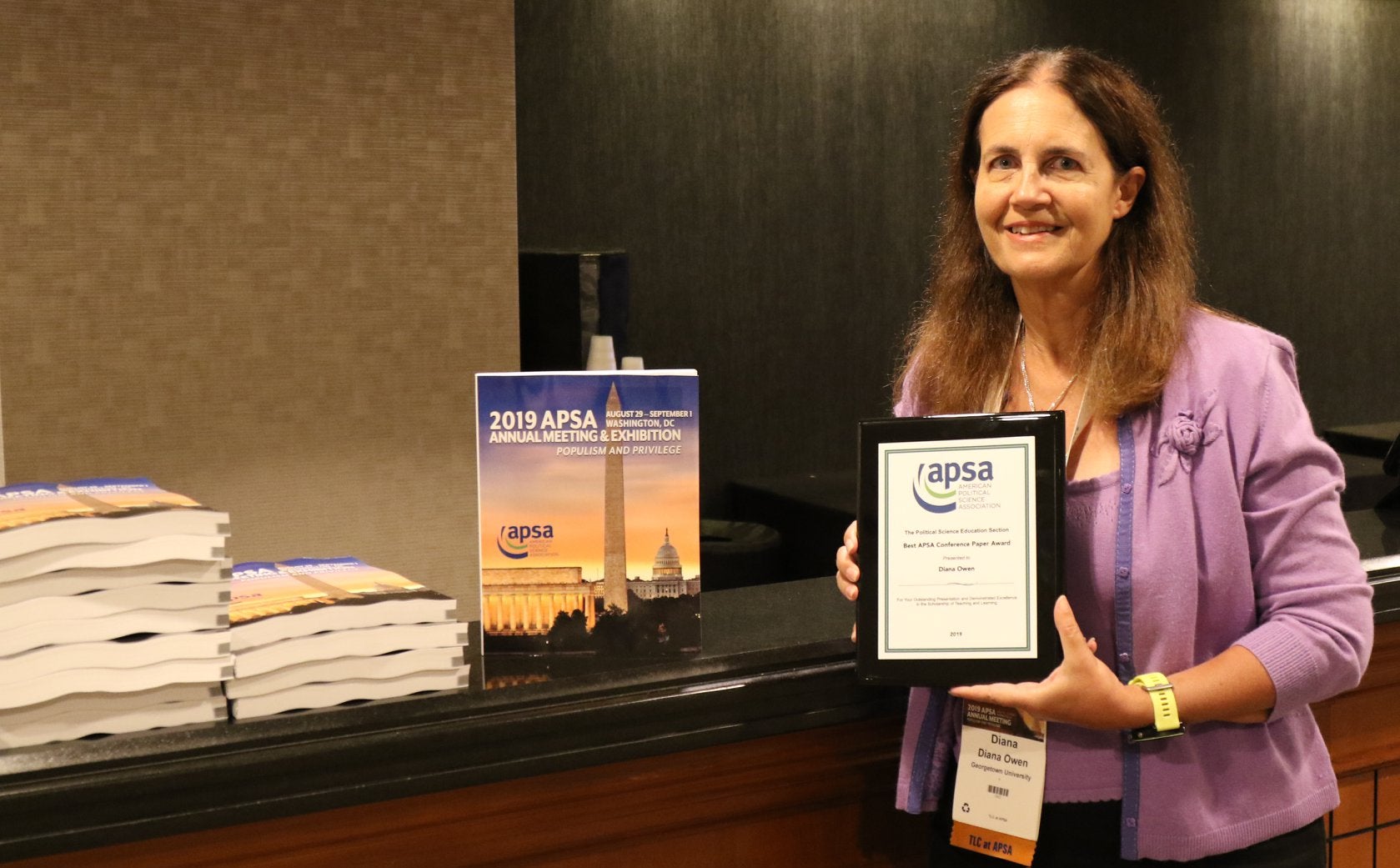CERL Wins Best APSA Conference Paper Award

Professor Diana Owen was honored by the American Political Science Association (APSA) with the Best APSA Conference Paper Award by the Political Science Education Section at the organization’s annual meeting on August 30, 2019, in Washington, D.C. Her paper, “Teaching Civics to High-Need Students,” assesses the impact of different teaching pedagogies on high-need students’ acquisition of civic knowledge, skills, and dispositions. The study focuses in particular on teaching methods that are central to the Center for Civic Education’s We the People: The Citizen and the Constitution (WTP) curriculum. Data were collected in conjunction with the James Madison Legacy Project (JMLP), a program that provides teachers of high-need students in middle and high school with professional development to enhance their classroom civics instruction by implementing WTP in their classrooms. The study finds that a combination of lecture and active learning approaches, such as the simulated congressional hearing used in the WTP curriculum, is most effective in conveying political knowledge. This paper is part of Professor Owen’s continuing research into civic education in the American school system.
Professor Diana Owen and alumna Kathryn Hartzell (CCT ’19) presented the paper, “High-Need Students’ Acquisition of Civic Disposition and Skills,” at the Annual Meeting of the American Political Science Association (APSA) in Washington, DC on September 1, 2019. The paper examines the effectiveness of the Center for Civic Education’s Congressional Academy in conveying civic orientations to students. The Academy is an immersive civics education program based on the Center’s We the People: The Citizen and the Constitution (WTP) curriculum. The study uses student survey and interview data collected at the 2019 Academy. Findings support that the Academy increased students’ knowledge of history and civics, especially for Title I school students who have fewer educational resources. Participation in the Academy significantly enhanced students’ political interest and attention, political discussion, community engagement, government service, civic duty, and trust in government. Students’ confidence in their civic skills also increased. The paper is the latest research from Georgetown’s Civics Education Research Lab (CERL) founded by Professor Owen, and is part of her continuing research into civic education in the American school system.
Professor Diana Owen presented the paper, “Populist Attitudes and Political Media Use,” at the American Political Science Association (APSA) Annual Meeting in Washington, D.C., on August 31, 2019. There is an assumption articulated in the scholarly literature which posits the characteristics of social media are conducive to the promulgation of populist messages which makes social media platforms especially appealing to citizens who hold populist attitudes. Thus, this study addresses the basic question: What is the relationship between people’s populist attitudes and their use of political media? The paper explores the questions: What are the populist attitudes held by social media users and traditional media users? Are people who hold populist attitudes more likely to use social media than people who do not have populist affinities? In what ways does social media use correspond to partisanship, ideology, and affinity for populist politicians? The paper teases out two different populist orientations: (1) people whose attitudes correspond to a Trump-style authoritarian populism and (2) people who embrace a first-order principle of populism as the will of the people. The findings suggest that people who are supportive of authoritarian populism hold more discretely identifiable political orientations and media use habits than those who agree that government should be guided by the will of the people. Overall, people with strong authoritarian populist attitudes are more frequent users of a range of political media than those who believe strongly in popular sovereignty. This paper was based on a survey data collected as part of the CCT course New Media and Politics in the spring semester 2019.
